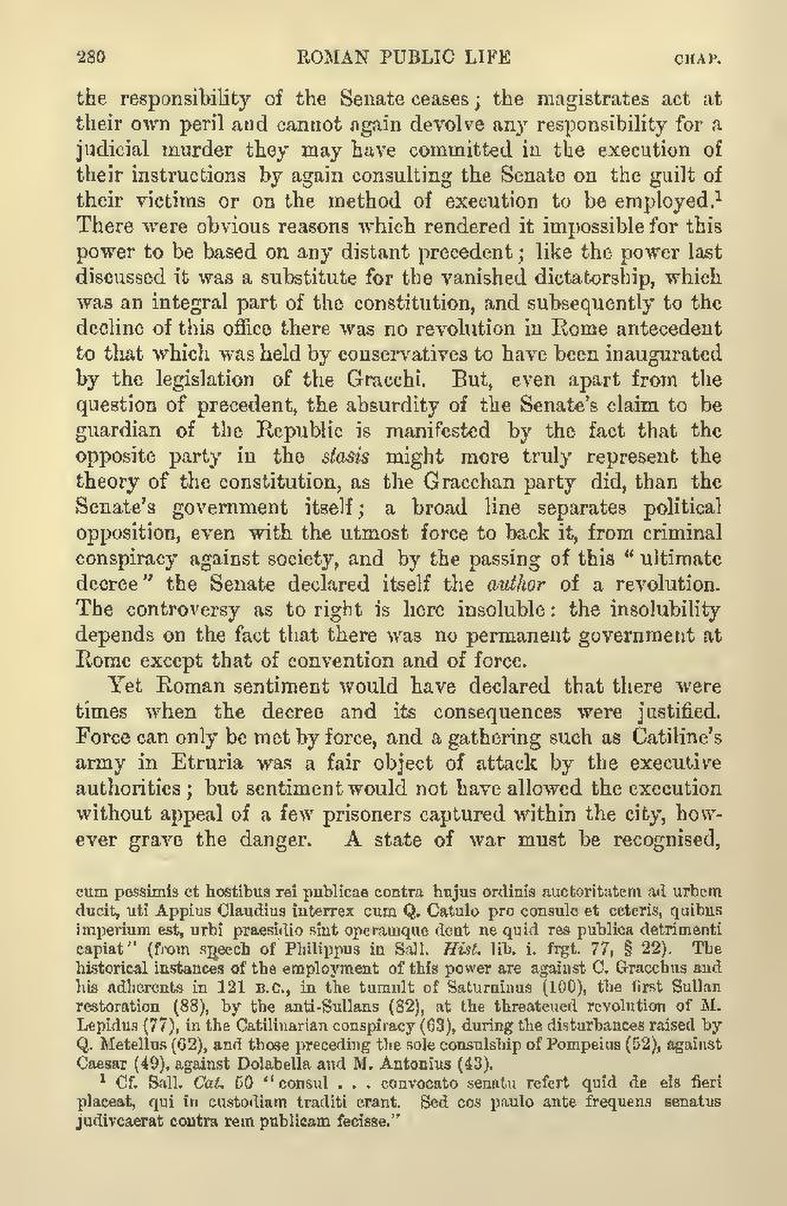the responsibility of the Senate ceases; the magistrates act at their own peril and cannot again devolve any responsibility for a judicial murder they may have committed in the execution of their instructions by again consulting the Senate on the guilt of their victims or on the method of execution to be employed.[1] There were obvious reasons which rendered it impossible for this power to be based on any distant precedent; like the power last discussed it was a substitute for the vanished dictatorship, which was an integral part of the constitution, and subsequently to the decline of this office there was no revolution in Rome antecedent to that which was held by conservatives to have been inaugurated by the legislation of the Gracchi. But, even apart from the question of precedent, the absurdity of the Senate's claim to be guardian of the Republic is manifested by the fact that the opposite party in the stasis might more truly represent the theory of the constitution, as the Gracchan party did, than the Senate's government itself; a broad line separates political opposition, even with the utmost force to back it, from criminal conspiracy against society, and by the passing of this "ultimate decree" the Senate declared itself the author of a revolution. The controversy as to right is here insoluble: the insolubility depends on the fact that there was no permanent government at Rome except that of convention and of force.
Yet Roman sentiment would have declared that there were times when the decree and its consequences were justified. Force can only be met by force, and a gathering such as Catiline's army in Etruria was a fair object of attack by the executive authorities; but sentiment would not have allowed the execution without appeal of a few prisoners captured within the city, however grave the danger. A state of war must be recognised,
- [Footnote: cum pessimis et hostibus rei publicae contra hujus ordinis auctoritatem ad urbem
ducit, uti Appius Claudius interrex cum Q. Catulo pro consule et ceteris, quibus imperium est, urbi praesidio sint operamque dent ne quid res publica detrimenti capiat" (from speech of Philippus in Sall. Hist. lib. i. frgt. 77, § 22). The historical instances of the employment of this power are against C. Gracchus and his adherents in 121 B.C., in the tumult of Saturninus (100), the first Sullan restoration (88), by the anti-Sullans (82), at the threatened revolution of M. Lepidus (77), in the Catilinarian conspiracy (63), during the disturbances raised by Q. Metellus (62), and those preceding the sole consulship of Pompeius (52), against Caesar (49), against Dolabella and M. Antonius (43).]
- ↑ Cf. Sall. Cat. 50 "consul . . . convocato senatu refert quid de eis fieri placeat, qui in custodiam traditi erant. Sed eos paulo ante frequens senatus judivcaerat contra rem publicam fecisse."
